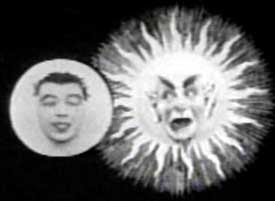December 29, 1907 [L’Éclipse du soleil en pleine lune/The Eclipse: Courtship of the Sun and Moon]
 Georges Méliès once again travels into the ether, and once more manages to combine the sublime with the grotesque—and the burlesque, especially of, as Whitman put it, "the learn’d astronomer," whose capering command of the heavens is tenuous, to say the least, as the planets, again animated (with hilariously obscene visages, licking lips, rolling eyeballs, constantly mouthing occult French utterances of love and lust) pass one another in comic satiation. Like Whitman, Méliès asserts himself above the empiricist—and in so doing, constructs a new rationality: his own as camera-magician attuned to the stars (and, it appears, their varied appetites) as no astronomer could ever hope to be.
Georges Méliès once again travels into the ether, and once more manages to combine the sublime with the grotesque—and the burlesque, especially of, as Whitman put it, "the learn’d astronomer," whose capering command of the heavens is tenuous, to say the least, as the planets, again animated (with hilariously obscene visages, licking lips, rolling eyeballs, constantly mouthing occult French utterances of love and lust) pass one another in comic satiation. Like Whitman, Méliès asserts himself above the empiricist—and in so doing, constructs a new rationality: his own as camera-magician attuned to the stars (and, it appears, their varied appetites) as no astronomer could ever hope to be.And when we trust the magician, and go to the stars with him, what do we receive? The music of the spheres, a harmony that presages Eternity? Heavens forbid—so to speak. In this quintessence, erotically charged pranks and slapstick reign, and all the "the proofs, the figures ... ranged in columns, ... the charts and the diagrams" scatter like a deck of cards tossed without skill, until—if I may do damage to Whitman's poem—we are led to the decidedly "moist night-air" to look "up in perfect[ly appalled] silence at the stars." Méliès is no poet but an iconoclast deriding the decorous and the rational as he crams the come-hither world into the camera, cutting and jumping whatever he films until it can be only a film.
This is, in the end, a grand accomplishment. The stage will not do, and the printed page even less so to achieve this cinematic reality—take it or leave it, vulgar and startling, approaching beauty—but with lovey-dovey smirks, nervous excitement brimming as the planets curl their lascivious lips and the Medieval astronomer dons his motley, more a clown than the white-face Sun and Moon.



Comments
Post a Comment